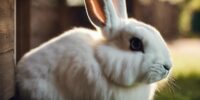Why Hyacinth Macaws Are Considered the Gentle Giants of the Parrot World
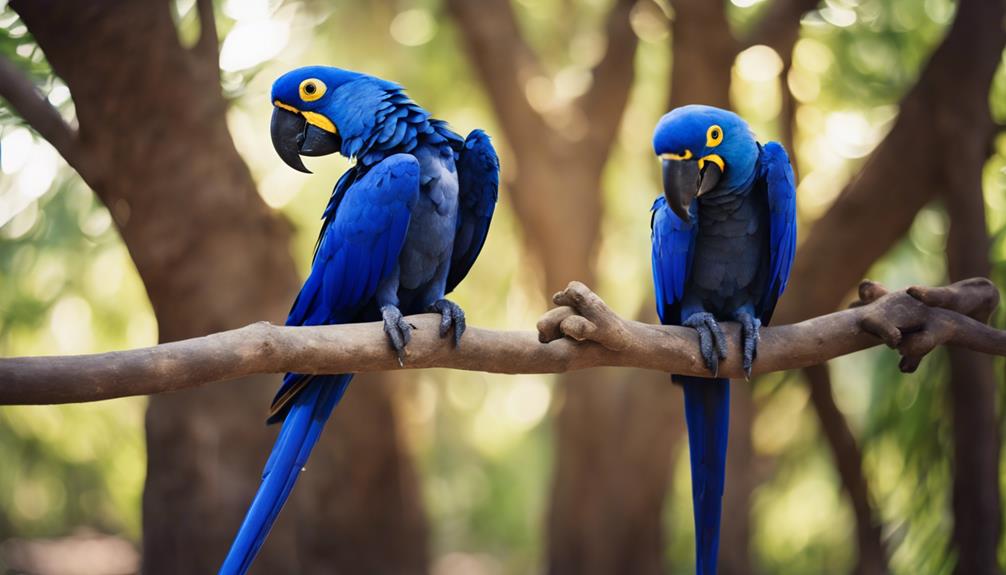
Hyacinth Macaws are native to central and eastern South America, where they inhabit tropical forests and palm swamps. They are recognized for their stunning cobalt-blue feathers, vibrant yellow eye rings, and powerful beaks, which they use to crack open tough nuts and seeds.
These majestic birds form strong pair bonds and are often seen flying and foraging together in pairs or small family groups. Hyacinth Macaws are an endangered species, primarily due to habitat loss and illegal trapping for the pet trade. Conservation efforts are underway to protect these magnificent birds and ensure their survival in the wild.
Impressive Size and Calm Demeanor
With their wingspan reaching up to 5 feet and weighing as much as 4.5 pounds, Hyacinth Macaws captivate observers with both their impressive size and remarkably calm demeanor. These majestic birds are primarily found in the subtropical forests and palm swamps of South America, with a particular affinity for the Pantanal region. Their diet consists mainly of nuts, seeds, and fruits, making them crucial for seed dispersal in their habitat. When it comes to nesting, Hyacinth Macaws are known to create their homes in tree cavities, where they lay one to three eggs at a time.
In terms of vocalizations, Hyacinth Macaws aren't as noisy as some other parrot species. They communicate through loud squawks and calls, often to mark territory or communicate with their mate. Despite their size, these birds exhibit a surprisingly gentle demeanor, known for their peaceful interactions with other birds and animals in their environment. The Hyacinth Macaw's calm nature and impressive physical characteristics make them truly stand out in the world of parrots.
Affectionate Nature Towards Humans
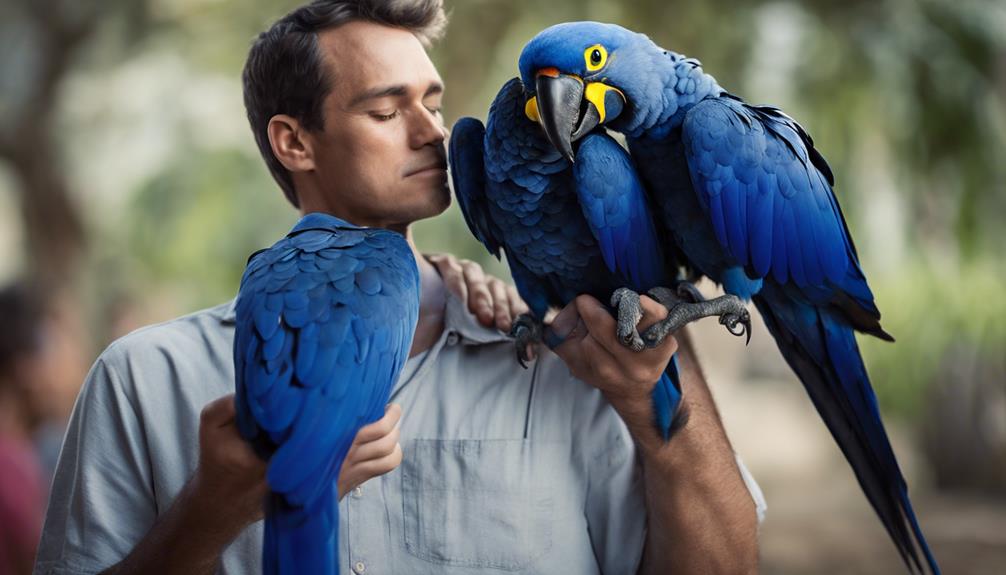
Hyacinth Macaws exhibit remarkable human-bonding behavior, often forming strong attachments with their caretakers.
These gentle giants of the parrot world are known to demonstrate trust easily towards humans, seeking affection and interaction.
Their affectionate nature towards humans is a testament to their social intelligence and adaptability in forming close relationships within their environment.
Human-Bonding Behavior
Known for their remarkable affectionate nature towards humans, Hyacinth Macaws display a unique bond that sets them apart in the world of parrots. Behavioral studies have shown that these majestic birds thrive on human interaction, forming deep connections with their caregivers.
When raised in a loving environment, Hyacinth Macaws exhibit a strong desire for companionship and are known to seek out physical contact with their human counterparts. This affectionate behavior is believed to stem from their social nature in the wild, where they form tight-knit family units.
Through positive reinforcement and consistent interaction, these gentle giants of the parrot world develop a trusting bond with humans, making them cherished companions for those who seek a loyal and loving avian friend.
Demonstrates Trust Easily
Their innate ability to demonstrate trust easily towards humans is a distinctive trait of Hyacinth Macaws, showcasing their affectionate nature. These majestic birds form strong bonds with their human companions through various means, making them a popular choice for those seeking a devoted avian friend. Here are some intriguing aspects of their trusting behavior:
- Training techniques: Hyacinth Macaws respond well to positive reinforcement methods, making them relatively easy to train and build trust with.
- Social interactions: These parrots thrive on social interactions, enjoying the company of their human caregivers and forming deep emotional connections.
- Vocal abilities: Known for their impressive vocal range, Hyacinth Macaws use their voices to express trust and affection towards their human companions.
- Dietary requirements: Providing a balanced diet is crucial for maintaining the health and trust of these gentle giants, emphasizing the importance of proper nutrition in their care.
Strong Bonds With Human Companions
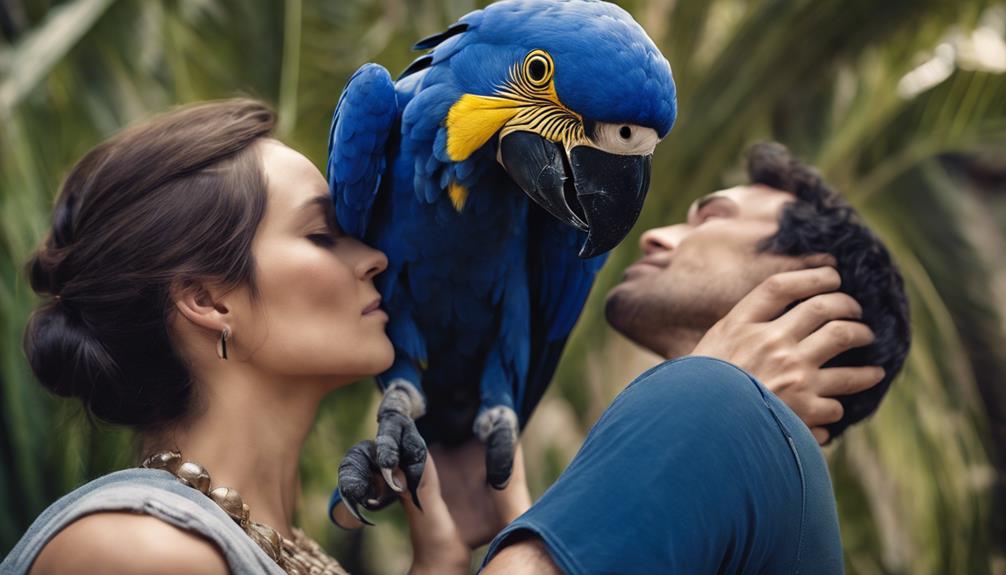
Developing strong bonds with their human companions, Hyacinth Macaws exhibit remarkable social intelligence and emotional connection. Through positive reinforcement training techniques and regular social interactions, these gentle giants of the parrot world form deep attachments with their caregivers. Hyacinth Macaws thrive on engaging with their human companions, eagerly participating in interactive activities that strengthen their bond.
These majestic birds have the ability to recognize individual human faces and voices, displaying a level of cognitive understanding that enhances their relationships. By engaging in activities such as playing games, solving puzzles, and even engaging in gentle physical contact, Hyacinth Macaws build trust and affection with those who care for them.
Their innate curiosity and sociable nature make them responsive to human emotions, often providing comfort and companionship. The strong bonds formed between Hyacinth Macaws and their human companions showcase the emotional depth and loyalty these birds possess, solidifying their reputation as the gentle giants of the parrot world.
Beauty and Majesty in Appearance
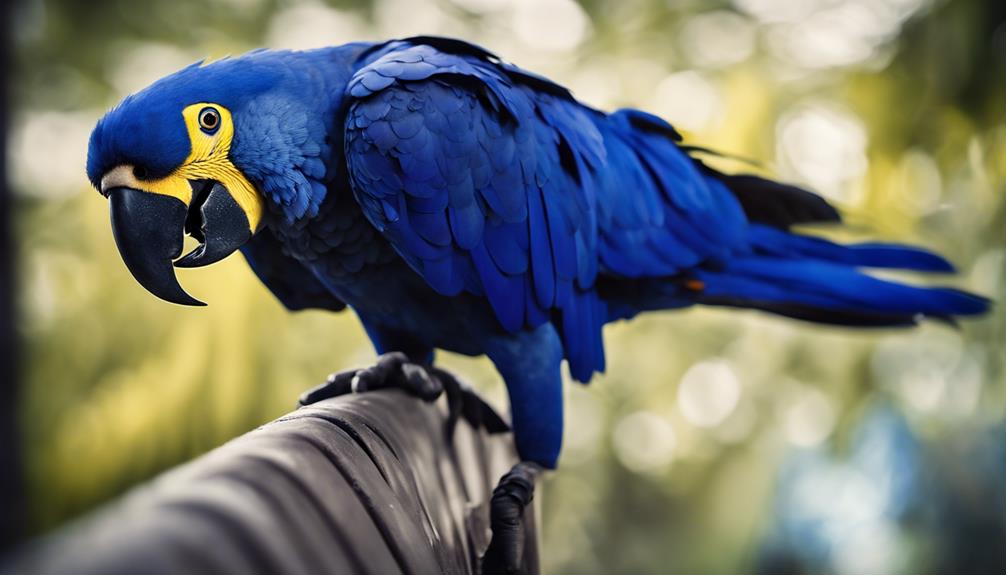
Exhibiting vibrant hues of cobalt blue and sunshine yellow, Hyacinth Macaws present a striking visual spectacle that captures the essence of beauty and majesty in their appearance. Their colorful plumage, accentuated by a prominent ring of bright yellow around each eye, is a sight to behold. These majestic birds aren't only visually stunning but also possess a grace in their flight that's unparalleled in the avian world.
- Vibrant Plumage: The cobalt blue feathers contrasted with the golden yellow tones create a mesmerizing display of colors.
- Graceful Flight: Hyacinth Macaws soar through the skies with elegance and agility, showcasing their majestic presence.
- Enchanting Vocalizations: Their deep, resonant calls add to their allure, captivating all who hear them.
- Playful Antics: Despite their grand appearance, Hyacinth Macaws exhibit playful behavior, further endearing them to onlookers.
In addition to their stunning appearance, these gentle giants of the parrot world enchant with their vocalizations and playful nature, making them truly remarkable creatures.
Gentle Disposition Towards Other Birds
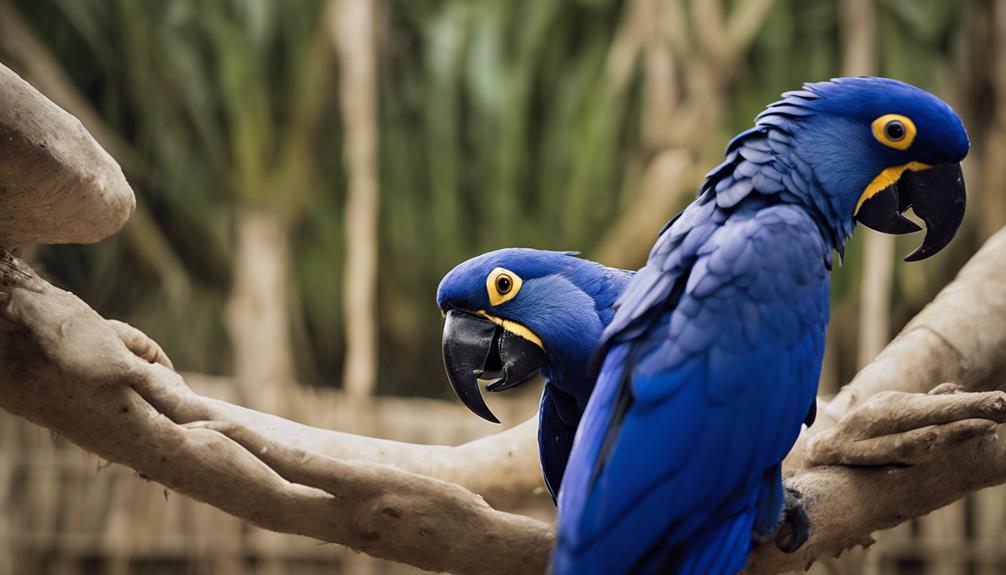
With a gentle disposition towards other birds, Hyacinth Macaws often display harmonious interactions in their social encounters. These majestic birds are known for forming interspecies friendships with a variety of bird species, showcasing their amiable nature and ability to coexist peacefully with others. In social interactions, Hyacinth Macaws exhibit a remarkable level of tolerance and cooperation, making them a delightful species to observe in group settings. Their gentle demeanor towards other birds reflects their strong social bonds and adaptability in diverse environments.
| Category | Description | Example |
|---|---|---|
| Communication | Vocalizations to convey needs and emotions | Soft calls to alert nearby birds of potential danger |
| Feeding Behavior | Sharing food resources with other birds | Allowing smaller bird species to feed alongside them |
| Nesting Habits | Cooperative nesting with different species | Allowing other birds to use parts of their nests |
| Mutual Grooming | Engaging in grooming behaviors with others | Grooming feathers of other bird species for hygiene |
| Playful Interactions | Playing games with other bird species | Engaging in aerial acrobatics with smaller birds |
Conservation Efforts and Threats Faced
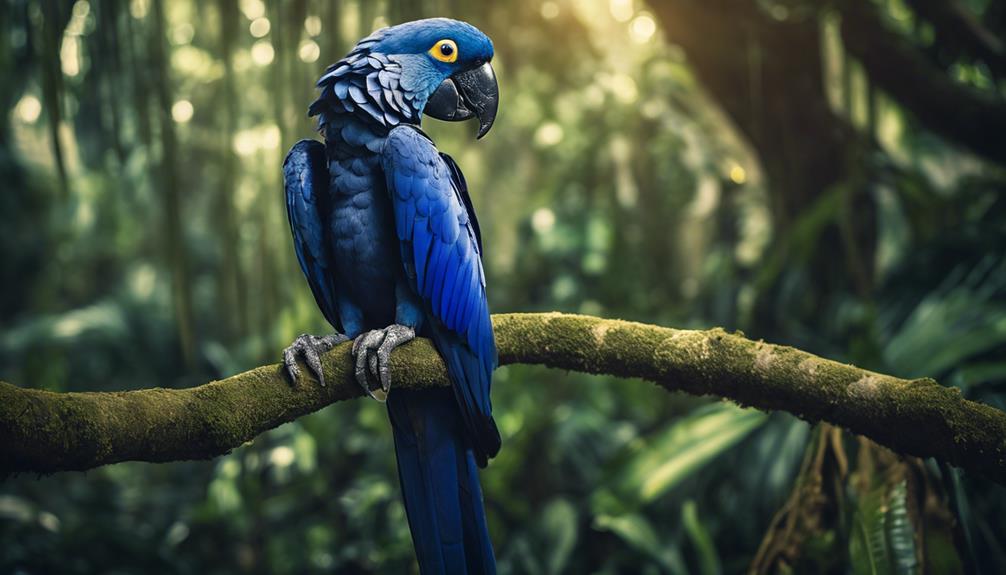
Hyacinth macaws face significant conservation challenges due to habitat loss, illegal pet trade, and hunting. Conservationists have implemented protective measures such as habitat restoration, anti-poaching patrols, and community education programs to safeguard these majestic birds.
Despite these efforts, hyacinth macaws remain vulnerable to ongoing threats that require continuous monitoring and conservation actions.
Conservation Challenges Faced
Conservation efforts for the Hyacinth Macaws face numerous challenges due to habitat loss, illegal wildlife trade, and limited genetic diversity. These factors threaten the survival of these majestic birds.
- Habitat Loss: Deforestation and conversion of their natural habitat for agriculture and human settlement are major concerns.
- Illegal Wildlife Trade: Hyacinth Macaws are highly sought after in the illegal pet trade market, leading to poaching and trafficking.
- Limited Genetic Diversity: Inbreeding depression due to the small population size can weaken the species' ability to adapt to changing environments.
- Climate Change: Increasing temperatures and altered precipitation patterns can impact food availability and nesting sites for the Hyacinth Macaws.
Protective Measures Taken
Amidst the challenges posed by habitat loss, illegal wildlife trade, and limited genetic diversity, various protective measures have been implemented to safeguard the Hyacinth Macaws' population and habitat. Conservation efforts have focused on utilizing training techniques to prepare captive-bred macaws for release into the wild successfully. By teaching these birds essential skills like foraging and predator avoidance, they're better equipped to survive once reintroduced.
Captive breeding programs play a crucial role in increasing the population of Hyacinth Macaws. These programs help maintain genetic diversity, mitigate the impact of poaching, and provide a safety net against population decline. Through a combination of training techniques and captive breeding, conservationists strive to secure a future for these majestic birds in their natural habitat.
Popular Choice Among Bird Enthusiasts
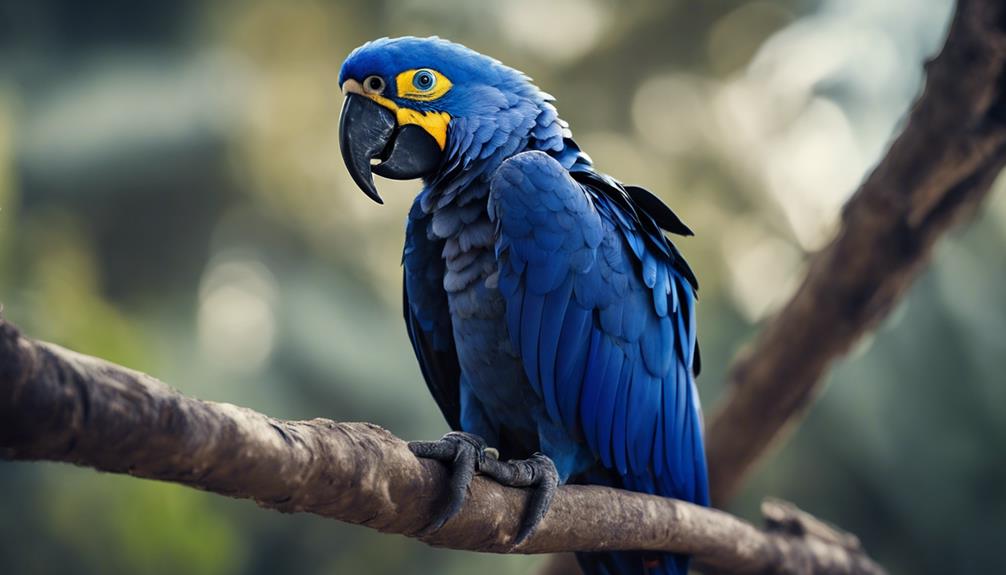
A favored choice among bird enthusiasts, the Hyacinth Macaw captivates with its striking blue plumage and impressive size. Bird lovers are drawn to these magnificent creatures for various reasons, including:
- Intelligence: Hyacinth Macaws are incredibly smart birds, making them a joy to train and interact with.
- Social Nature: Known for their affectionate and sociable personalities, these parrots thrive on human interaction.
- Longevity: With a lifespan of up to 60 years, owning a Hyacinth Macaw can be a lifelong companionship.
- Dietary Versatility: While their diet primarily consists of nuts and seeds, these birds can adapt to a variety of foods, making them relatively easy to care for.
Bird enthusiasts appreciate the captivating beauty and engaging characteristics of Hyacinth Macaws, making them a popular choice among those looking for a devoted avian companion. Their intelligence, social nature, longevity, and dietary adaptability contribute to their appeal and the joy they bring to their owners.
Frequently Asked Questions
How Do Hyacinth Macaws Communicate With Humans and Other Birds?
Hyacinth macaws communicate through vocal mimicry and body language. Despite their large size, these gentle giants excel in social interactions and bonding with both humans and other birds, showcasing their intelligence and emotional depth.
What Are Some Common Misconceptions About Hyacinth Macaws?
Common myths about Hyacinth Macaws include misconceptions about their aggressive nature and difficulty in training. In reality, these gentle giants exhibit complex behavioral patterns and can form strong bonds with humans and other birds.
Are Hyacinth Macaws Suitable Pets for First-Time Bird Owners?
Hyacinth macaws are not recommended for first-time bird owners due to their specialized care needs, training methods, and socialization requirements. Bonding techniques are crucial for their well-being, as they are highly intelligent and social creatures.
How Do Hyacinth Macaws Contribute to the Ecosystem in Their Natural Habitat?
Hyacinth Macaws contribute significantly to the ecosystem by dispersing seeds of the palm trees they feed on, promoting forest regeneration. Conservation efforts focus on habitat preservation to safeguard their food sources and maintain biodiversity in their natural habitat.
What Are Some Lesser-Known Facts About the Breeding and Reproductive Habits of Hyacinth Macaws?
In the realm of breeding behavior and nesting habits, Hyacinth Macaws display remarkable commitment to their partners and offspring. Their bond is as strong as the sturdy nest they build, symbolizing unwavering dedication.





